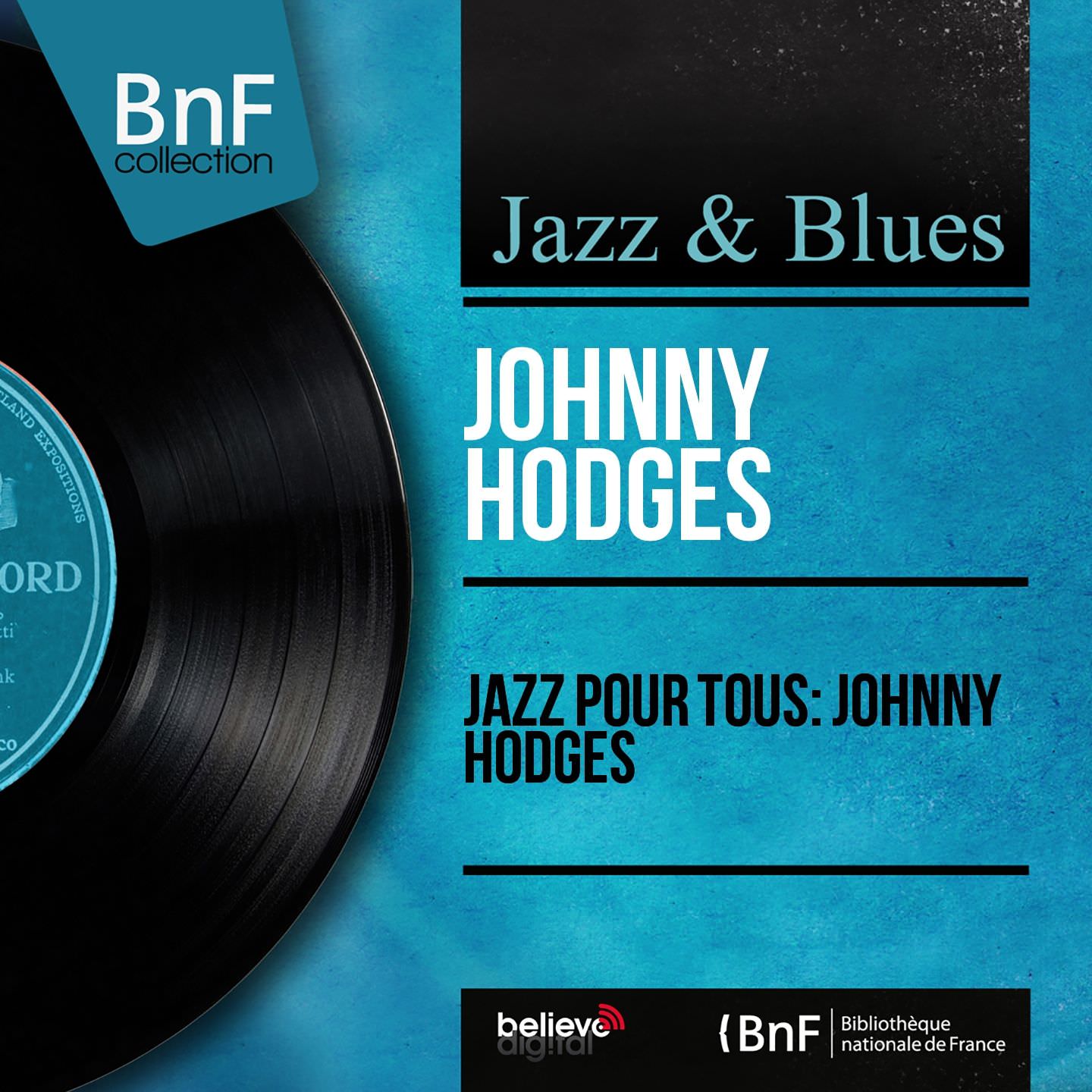
Johnny Hodges – Jazz pour tous: Johnny Hodges (1957/2014)
FLAC (tracks) 24 bit/96 kHz | Time – 28:34 minutes | 263 MB | Genre: Jazz
Studio Masters, Official Digital Download – Source: Qobuz | Booklet, Front Cover | © BnF Collection
“Jazz pour tous: Johnny Hodges” is a collection recordings of Johnny Hodges compiles from the archives of Bibliothèque nationale de France… The BnF’s audio collection, with over a million audio documents, is one of the oldest and most important ones in the world. Born in 1911 as the Archives de la parole (Archives of the spoken word), it was fortunate enough to be the recipient of donations from contemporary phonographic companies. In 1938, with the institution of legal deposit for phonograms, these contributions became systematic; to this very day, they constitute the collection’s main growth vector, forming a one-of-a-kind national heritage. This legal deposit is further complemented by donations and acquisitions.
Possessor of the most beautiful tone ever heard in jazz, altoist Johnny Hodges formed his style early on and had little reason to change it through the decades. Although he could stomp with the best swing players and was masterful on the blues, Hodges’ luscious playing on ballads has never been topped. He played drums and piano early on before switching to soprano sax when he was 14. Hodges was taught and inspired by Sidney Bechet, although he soon used alto as his main ax; he would regretfully drop soprano altogether after 1940. His early experiences included playing with Lloyd Scott, Chick Webb, Luckey Roberts, and Willie “The Lion” Smith (1924), and he also had the opportunity to work with Bechet. However, Johnny Hodges’ real career began in 1928 when he joined Duke Ellington’s orchestra. He quickly became one of the most important solo stars in the band and a real pacesetter on alto; Benny Carter was his only close competition in the 1930s. Hodges was featured on a countless number of performances with Ellington and also had many chances to lead recording dates with Ellington’s sidemen. Whether it was “Things Ain’t What They Used to Be,” “Come Sunday,” or “Passion Flower,” Hodges was an indispensable member of Ellington’s orchestra in the 1930s and ’40s. It was therefore a shock, in 1951, when he decided to leave Duke Ellington and lead a band of his own. Hodges had a quick hit in “Castle Rock” (which ironically showcased Al Sears’ tenor and had no real contribution by the altoist), but his combo ended up struggling and breaking up in 1955. Hodges’ return to Duke Ellington was a joyous occasion and he never really left again. In the 1960s, Hodges teamed up with organist Wild Bill Davis on some sessions, leading to Davis joining Ellington for a time in 1969. Johnny Hodges, whose unchanging style always managed to sound fresh, was still with Duke Ellington when he suddenly died in 1970.
Tracklist:
01 – Caravan
02 – Pelican Drag
03 – Tapioca
04 – Minuet in Blues
05 – Clouds in My Heart
06 – Swingin On the Campus
07 – Pyramid
08 – The Jeeep Is Jumpin
09 – Jitterbug’s Lullaby
10 – The Rabbit’s Jump
Download:
mqs.link_JhnnyHdgesJazzpurtus.JhnnyHdges19572014Qbuz2496.rar




















![Django Reinhardt - 100 Essentials of Django Reinhardt (Mono Version) (2014) [FLAC 24bit/96kHz] Django Reinhardt - 100 Essentials of Django Reinhardt (Mono Version) (2014) [FLAC 24bit/96kHz]](https://getimg.link/images/imgimgimg/uploads/2019/09/naS2ZKr.jpg)
![Buck Clayton, Coleman Hawkins - Petits jazz pour tous no.21 (1959/2014) [Qobuz FLAC 24bit/96kHz] Buck Clayton, Coleman Hawkins - Petits jazz pour tous no.21 (1959/2014) [Qobuz FLAC 24bit/96kHz]](https://getimg.link/images/imgimgimg/uploads/2019/03/USJITUb.jpg)
![Frank Sinatra - The Very Best of Frank Sinatra (2016) [Qobuz FLAC 24bit/96kHz] Frank Sinatra - The Very Best of Frank Sinatra (2016) [Qobuz FLAC 24bit/96kHz]](https://getimg.link/images/imgimgimg/uploads/2019/07/PriXP4q.jpg)
![John Coltrane - The Very Best Of John Coltrane (2014) [Qobuz FLAC 24bit/96kHz] John Coltrane - The Very Best Of John Coltrane (2014) [Qobuz FLAC 24bit/96kHz]](https://getimg.link/images/imgimgimg/uploads/2019/08/J78iP7M.jpg)
![Thelonious Monk - 35 Essentials Of Thelonious Monk (2014) [Qobuz FLAC 24bit/96kHz] Thelonious Monk - 35 Essentials Of Thelonious Monk (2014) [Qobuz FLAC 24bit/96kHz]](https://getimg.link/images/imgimgimg/uploads/2019/08/SuXV7Lz.jpg)
![Sarah Vaughan - 10 Essentials Of Sarah Vaughan (2015) [Qobuz FLAC 24bit/96kHz] Sarah Vaughan - 10 Essentials Of Sarah Vaughan (2015) [Qobuz FLAC 24bit/96kHz]](https://getimg.link/images/imgimgimg/uploads/2019/08/Gf3SnUA.jpg)
![Johnny Hodges - The Big Sound (1958/2023) [FLAC 24bit/192kHz] Johnny Hodges - The Big Sound (1958/2023) [FLAC 24bit/192kHz]](https://imghd.xyz/images/2023/04/08/ui6ustse5rqxb_600.jpg)
![Buck Clayton - A Buck Clayton Jam Session (1955/2014) [Qobuz FLAC 24bit/96kHz] Buck Clayton - A Buck Clayton Jam Session (1955/2014) [Qobuz FLAC 24bit/96kHz]](https://getimg.link/images/imgimgimg/uploads/2019/03/klpJ5mo.jpg)
![Johnny Hodges - Johnny Hodges featuring Ben Webster (2018) [AcousticSounds DSF DSD128/5.64MHz + FLAC 24bit/88,2kHz] Johnny Hodges - Johnny Hodges featuring Ben Webster (2018) [AcousticSounds DSF DSD128/5.64MHz + FLAC 24bit/88,2kHz]](https://getimg.link/images/imgimgimg/uploads/2019/03/jU9l2DZ.jpg)
![Johnny Hodges & Charlie Shavers - Half and Half (1981/2018) [HDTracks FLAC 24bit/192kHz] Johnny Hodges & Charlie Shavers - Half and Half (1981/2018) [HDTracks FLAC 24bit/192kHz]](https://getimg.link/images/imgimgimg/uploads/2020/08/YyF4PhK.jpg)
![Lillo Quaratino - Parole Inutili (2013) [e-Onkyo FLAC 24bit/96kHz] Lillo Quaratino - Parole Inutili (2013) [e-Onkyo FLAC 24bit/96kHz]](https://getimg.link/images/imgimgimg/uploads/2019/01/fN2T1eF.jpg)
![Wild Bill Davis & Johnny Hodges - Con-Soul And Sax (1965/2015) [Qobuz FLAC 24bit/96kHz] Wild Bill Davis & Johnny Hodges - Con-Soul And Sax (1965/2015) [Qobuz FLAC 24bit/96kHz]](https://getimg.link/images/imgimgimg/uploads/2016/11/Guce3rk.jpg)
![Duke Ellington and Johnny Hodges - Side By Side (1959/2014) [HDTracks FLAC 24bit/192kHz] Duke Ellington and Johnny Hodges - Side By Side (1959/2014) [HDTracks FLAC 24bit/192kHz]](https://getimg.link/images/imgimgimg/uploads/2016/06/GmGO6qV.jpg)
![Oliver Nelson, Johnny Hodges, Leon Thomas - Three Shades of Blue (1970/2016) [FLAC 24bit/96kHz] Oliver Nelson, Johnny Hodges, Leon Thomas - Three Shades of Blue (1970/2016) [FLAC 24bit/96kHz]](https://i0.wp.com/imghd.xyz/images/2022/05/05/0029667819985_600.jpg?resize=500%2C500&ssl=1)
![Cannonball Adderley - Swingin’ in Seattle - Live at the Penthouse 1966-1967 (Remastered) (2019) [FLAC 24bit/96kHz] Cannonball Adderley - Swingin’ in Seattle - Live at the Penthouse 1966-1967 (Remastered) (2019) [FLAC 24bit/96kHz]](https://getimg.link/images/imgimgimg/uploads/2019/11/YRCmhrq.jpg)